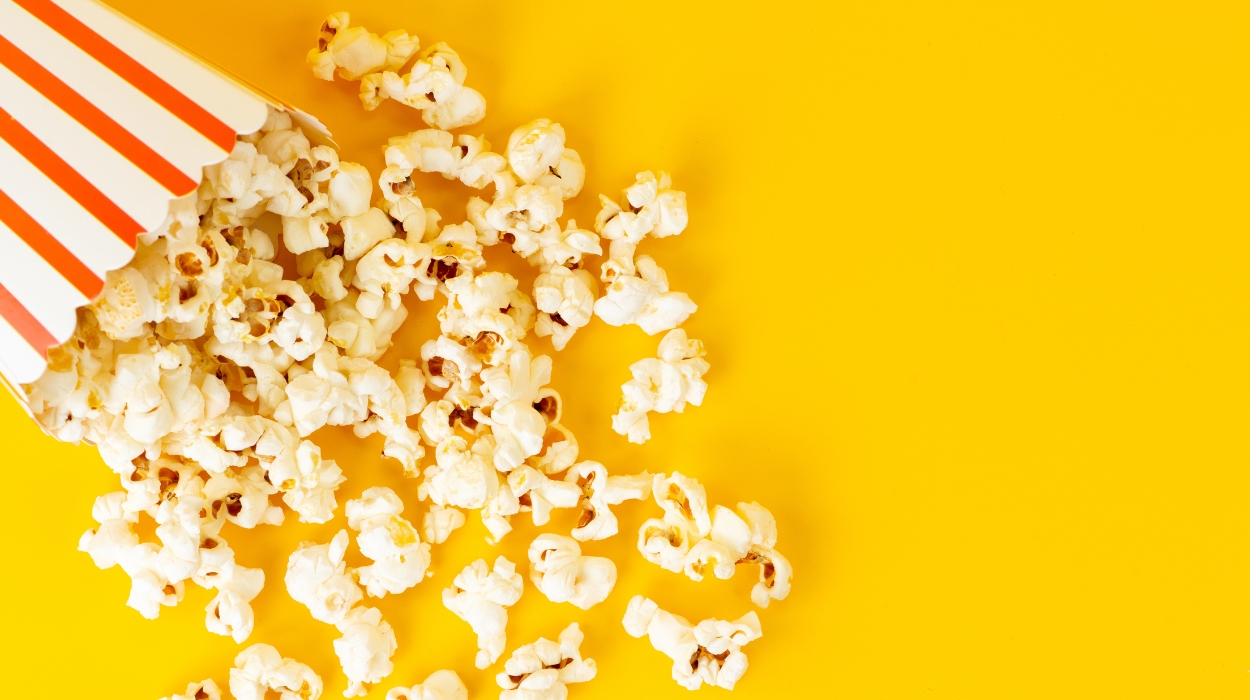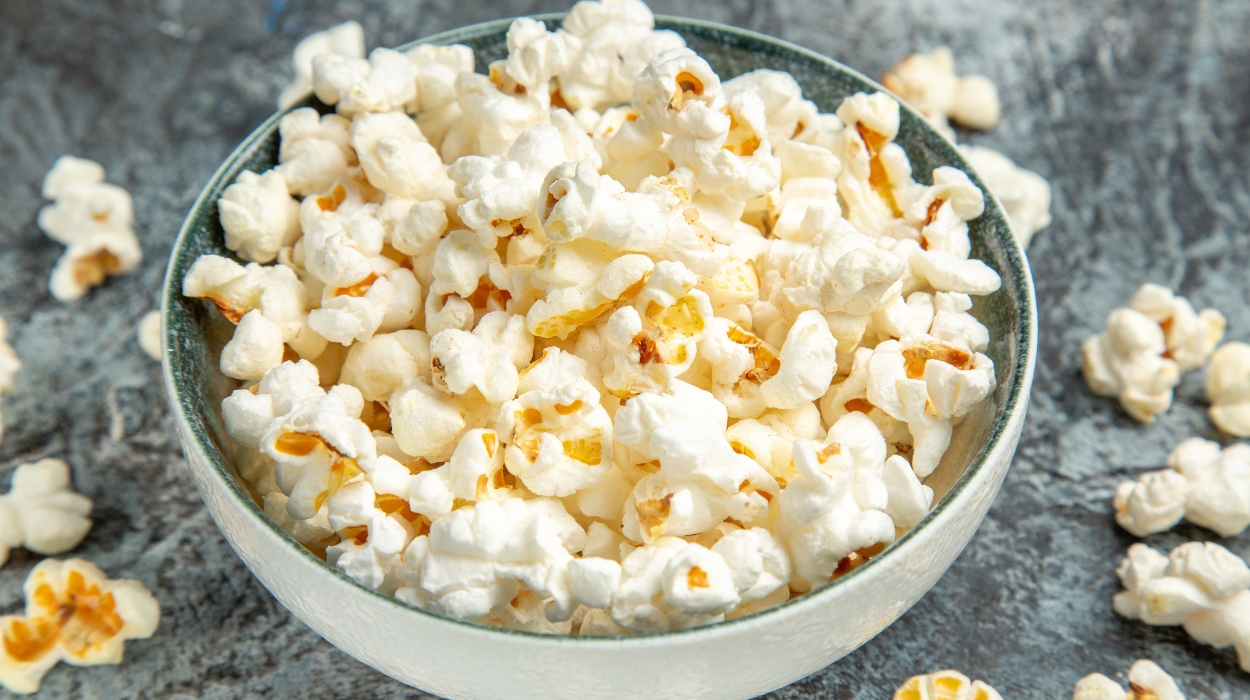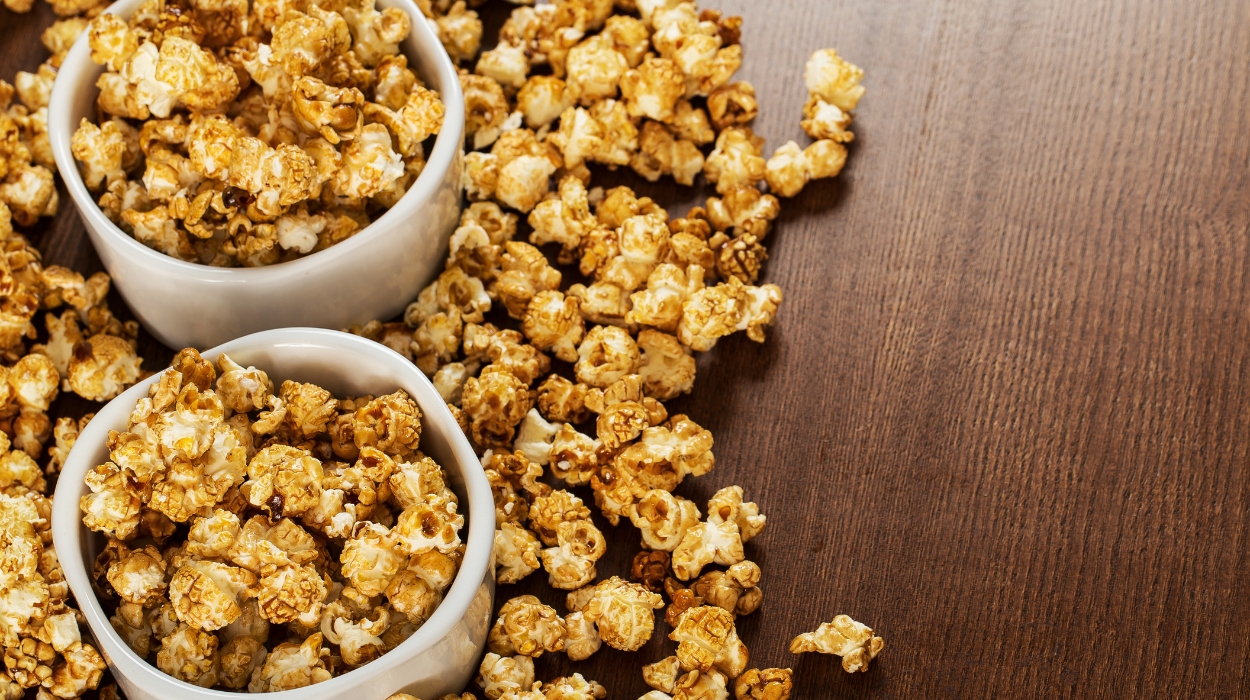 Expert's opinion
Expert's opinion
Expert's opinion
The article is a subjective view on this topic written by writers specializing in medical writing.
It may reflect on a personal journey surrounding struggles with an illness or medical condition, involve product comparisons, diet considerations, or other health-related opinions.
Although the view is entirely that of the writer, it is based on academic experiences and scientific research they have conducted; it is fact-checked by a team of degreed medical experts, and validated by sources attached to the article.
The numbers in parenthesis (1,2,3) will take you to clickable links to related scientific papers.
Is Popcorn Healthy? Nutrition Facts, Benefits & Side Effects 2024

Popcorn has been a popular snack for decades, but is popcorn good for you? While it’s true that popcorn can be high in calories and fat depending on the type you eat, popcorn can also be a healthy snack if eaten in moderation.
Popcorn is a whole grain and contains fiber, vitamins, minerals, and antioxidants. It’s also relatively low in calories compared to many other snacks like chips or candy bars. The key to enjoying the health benefits of popcorn while limiting its potential diet-wrecking risks is to focus on portion control and choose healthier topping options such as garlic powder or olive oil instead of butter or processed cheese sauces.
When eaten in moderation, popcorn and these other healthy snacks can make a delicious addition to any diet.
Is Popcorn Good For You?
There are plenty of popcorn benefits that make it an excellent snack choice. It is low in calories and fat, which is great for weight management.
Popcorn is a whole-grain food, meaning it contains all the essential parts and naturally occurring nutrients of a grain seed. Eating whole grains has been linked[1] to a lowered risk of cardiovascular disease, stroke, type two diabetes, obesity, and certain types of cancer.
Popcorn contains fiber, which prevents constipation[2] and can help lower your cholesterol levels, as well as carbohydrates, which provide energy and promote digestive health.
Is Popcorn Healthy For You?
Is popcorn a healthy snack? It can be. Its air-popped form is low in calories and even contains a few essential nutrients. Popcorn is a whole grain and provides fiber, which may help with digestion, blood sugar control, and lowering cholesterol.[3] It also provides small amounts of several vitamins and minerals, such as magnesium and zinc. Additionally, popcorn contains polyphenols,[4] which are compounds that act as antioxidants to protect cells against damage from the aging effects of free radicals.
Popcorn may benefit heart health by helping to reduce cholesterol levels due to the amount of fiber it contains. The fiber content also helps promote longer satiety, or the feeling of being full after eating a meal, which can help prevent overeating or snacking on unhealthy foods between meals.
However, it’s important to note that healthy forms of popcorn are those that are air-popped or have minimal added calorie-dense ingredients such as butter or oil. Adding too much butter or salt can significantly increase popcorn’s calorie and sodium content while eliminating some beneficial nutrients like fiber.
Overall, popcorn can be an excellent snack choice when consumed in moderation in its air-popped form—without excess oil or salt.
Is Popcorn Healthy For Weight Loss?

Popcorn has become a popular low-calorie snack for those looking to lose weight. However, the answer to whether or not popcorn is healthy for weight loss depends on how it is prepared. While popcorn kernels themselves are low in calories and fat, they can quickly become unhealthy when loaded with butter, cheese, sugar, and other processed ingredients.
When eaten plain, air-popped popcorn may benefit weight loss as it promotes satiety better than other unhealthy snack foods. Being high in fiber, popcorn helps you feel full longer. As a result, eating popcorn may help you eat fewer calories overall, which may lead to weight loss.
While some believe that popcorn should be avoided because it is a carbohydrate food and carbohydrates are often associated with weight gain, this isn’t necessarily true. Eating whole grains like popcorn as part of a calorie-controlled diet may help individuals reach their weight loss goals.[5] Whole grain foods contain complex carbohydrates that break down more slowly than simple carbs like white bread or pasta and provide consistent energy throughout the day; thus, you don’t experience hunger pangs or cravings as easily.
Is Popcorn Healthy For Diabetics?
Popcorn can be OK in moderation for diabetics,[6] but it depends on how it’s prepared. People with diabetes should opt for plain popcorn or popcorn with salty or spicy, i.e., savory, toppings and avoid sugar-laden varieties such as caramel corn or kettle corn. The salty or spicy savory direction is fine as long as sweetness is avoided; otherwise, you may experience, blood sugar spikes.
Air-popped popcorn is the healthiest preparation method for diabetics as it is low in saturated fat, which could affect blood pressure. Furthermore, air-popped popcorn provides more dietary fiber than other snacks — about four grams per three-cup serving — which may help keep blood sugar levels much more stable than a candy bar or chips would.
If you are a diabetic and want some more inspiration for tasty snacks, check out our guide on snacks for diabetics!
Nutritional Value
Per 100 grams, popcorn contains just 387 kilocalories of energy; however, it also packs a nutritional punch. Popcorn is rich in various essential vitamins and minerals,[7] including magnesium, phosphorus, zinc, and thiamine. Magnesium helps to regulate muscle and nerve function, while zinc aids in immune system functioning.
Popcorn also contains antioxidants such as polyphenols and flavonoids that fight against free radicals to protect against cellular damage caused by oxidative stress.[8] Thiamine found in popcorn may aid in the metabolism of proteins and carbohydrates.
Downsides Of Popcorn

With all this good news, why is popcorn bad for you? Unfortunately, movie theater popcorn is highly processed and heavily loaded with salt, fat, and sugar, the triple-whammy that can contribute to obesity, high cholesterol levels, and heart disease[9] when consumed in large quantities.
Worse, highly processed popcorn also contains trans fats and artificial flavorings that have been linked to an increased risk of cancer.[10] If you are looking for a snack other than processed popcorn as a snack instead of fruits and vegetables, you may want to consider a whole-food vegetable supplement to cover any nutritional gaps.
Furthermore, popcorn can be difficult for people with certain food allergies or sensitivities. Common allergens found in popcorn include soybean oil, corn allergens, and wheat allergens. If you’re eating flavored popcorn at the theater or pre-packaged microwave popcorn at home in those little packets, you’ll want to be aware of the number of preservatives and chemicals used in these products. These preservatives may contain compounds such as benzoates and propionates that are considered carcinogenic by some experts.[11]
How To Prepare Popcorn?
So which popcorn is healthy? One of the healthiest ways to prepare and eat popcorn is air-popped popcorn. This method doesn’t require oil or butter and can be made in various ways, such as by popping it in an air popper, an electric popcorn maker, on the stove in a pot with a lid, an air fryer, or even in the microwave. It’s important to use only non-genetically modified organism corn kernels if you choose to pop them on the stove or in a pan.
When preparing your popcorn, be sure to avoid adding lots of salt or butter, which can add unhealthy fat and calories. Instead, try experimenting with different seasonings like herbs and spices for added flavor. For example, try sprinkling some nutritional yeast onto your freshly popped kernels for a cheesy flavor. You could also use nutmeg and cinnamon for a sweet and savory popcorn snack.
Adding healthy toppings is another great way to ensure you eat nutritious popcorn. Try tossing your popped kernels with olive oil, chopped nuts, dried fruits, or grated cheese. To make sure you don’t overdo it on the salt again, you can opt for unsalted varieties of these additional toppings instead.
Some Fun Popcorn Recipes!
- Combine five cups of plain popped corn with two tablespoons of olive oil, one teaspoon each of garlic powder and onion powder, one teaspoon of chili powder, and some salt. This combination makes for a delicious snack that’s full of flavor without being too heavy on calories.
- If you want something sweeter, combine three cups of plain popped corn with one tablespoon of melted coconut oil and one-fourth cup of honey. Once you’ve mixed these ingredients into a bowl, sprinkle the mixture over the popcorn and bake it in the oven at 350 degrees Fahrenheit until it is lightly golden brown.
- Mix up two tablespoons of olive oil with half a teaspoon of smoked paprika, half a teaspoon of garlic powder, half a teaspoon of onion powder, and some salt to taste before tossing it into three cups of plain popped popcorn. Put this mixture into an oven-proof dish and bake at 350 degrees Fahrenheit until lightly golden brown.
Final Thought
If you are looking for a snack that isn’t a sugar-laden candy bar or a salty packet of chips, then air-popped popcorn is a decent enough alternative. Air-popped popcorn does not contain any added salt or sugar that is typically found in pre-packaged types. Therefore, if consumed in moderation and prepared healthily, popcorn can be part of a balanced diet for adults and kids alike.
+ 11 sources
Health Canal avoids using tertiary references. We have strict sourcing guidelines and rely on peer-reviewed studies, academic researches from medical associations and institutions. To ensure the accuracy of articles in Health Canal, you can read more about the editorial process here
- McRae, M.P. (2017). Health Benefits of Dietary Whole Grains: An Umbrella Review of Meta-analyses. Journal of Chiropractic Medicine, [online] 16(1), pp.10–18. doi:https://doi.org/10.1016/j.jcm.2016.08.008.
- Alice, Drysdale, C., Whelan, K. and Eirini Dimidi (2022). The Effect of Fiber Supplementation on Chronic Constipation in Adults: An Updated Systematic Review and Meta-Analysis of Randomized Controlled Trials. The American Journal of Clinical Nutrition, [online] 116(4), pp.953–969. doi:https://doi.org/10.1093/ajcn/nqac184.
- Reynolds, A.N., Akerman, A.P. and Mann, J. (2020). Dietary fibre and whole grains in diabetes management: Systematic review and meta-analyses. PLOS Medicine, [online] 17(3), pp.e1003053–e1003053. doi:https://doi.org/10.1371/journal.pmed.1003053.
- Coco, M.G. and Vinson, J.A. (2019). Analysis of Popcorn (Zea mays L. var. everta) for Antioxidant Capacity and Total Phenolic Content. Antioxidants, [online] 8(1), pp.22–22. doi:https://doi.org/10.3390/antiox8010022.
- Maki, K.C., Palacios, O.M., Koecher, K., Sawicki, C.M., Livingston, K.A., Bell, M., Heather Nelson Cortes and McKeown, N.M. (2019). The Relationship between Whole Grain Intake and Body Weight: Results of Meta-Analyses of Observational Studies and Randomized Controlled Trials. Nutrients, [online] 11(6), pp.1245–1245. doi:https://doi.org/10.3390/nu11061245.
- Asif, M. (2014). The prevention and control the type-2 diabetes by changing lifestyle and dietary pattern. Journal of education and health promotion, [online] 3(1), pp.1–1. doi:https://doi.org/10.4103/2277-9531.127541.
- Prasanthi, P.S., N. Naveena, M. Vishnuvardhana Rao and K. Bhaskarachary (2017). Compositional variability of nutrients and phytochemicals in corn after processing. Journal of Food Science and Technology, [online] 54(5), pp.1080–1090. doi:https://doi.org/10.1007/s13197-017-2547-2.
- Pizzino, G., Irrera, N., Cucinotta, M., Pallio, G., Mannino, F., Arcoraci, V., Squadrito, F., Altavilla, D. and Bitto, A. (2017). Oxidative Stress: Harms and Benefits for Human Health. Oxidative Medicine and Cellular Longevity, [online] 2017, pp.1–13. doi:https://doi.org/10.1155/2017/8416763.
- Gupta, L., Khandelwal, D., Dutta, D., Kalra, S., Lal, P.R. and Gupta, Y. (2018). The twin white herrings: Salt and sugar. Indian Journal of Endocrinology and Metabolism, [online] 22(4), pp.542–542. doi:https://doi.org/10.4103/ijem.ijem_117_18.
- Debras, C., Eloi Chazelas, Srour, B., Druesne-Pecollo, N., Younes Esseddik, Fabien, Cédric Agaësse, Alexandre De Sa, Lutchia, R., Gigandet, S., Huybrechts, I., Julia, C., Emmanuelle Kesse-Guyot, Allès, B., Andreeva, V.A., Galan, P., Serge Hercberg, Mélanie Deschasaux-Tanguy and Touvier, M. (2022). Artificial sweeteners and cancer risk: Results from the NutriNet-Santé population-based cohort study. PLOS Medicine, [online] 19(3), pp.e1003950–e1003950. doi:https://doi.org/10.1371/journal.pmed.1003950.
- Nutrition and Cancer. (2019). The Association between the Preservative Agents in Foods and the Risk of Breast Cancer. [online] Available at: https://www.tandfonline.com/doi/abs/10.1080/01635581.2019.1608266?journalCode=hnuc20 [Accessed 25 Feb. 2024].



